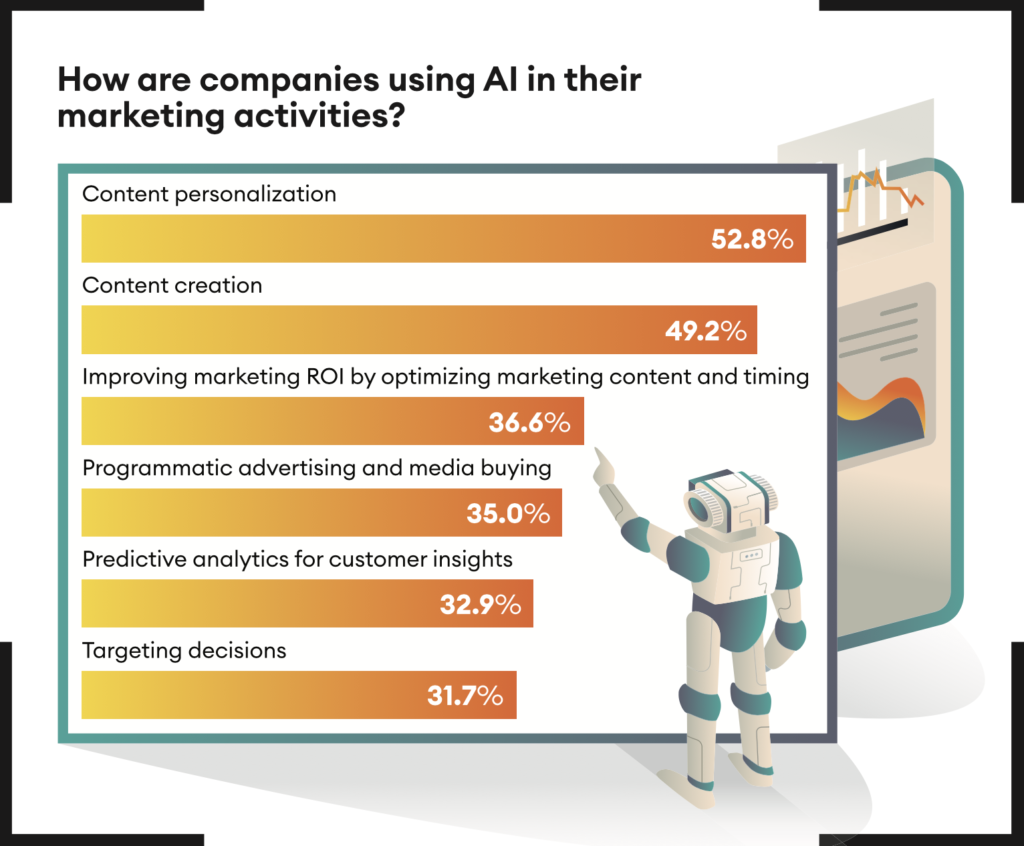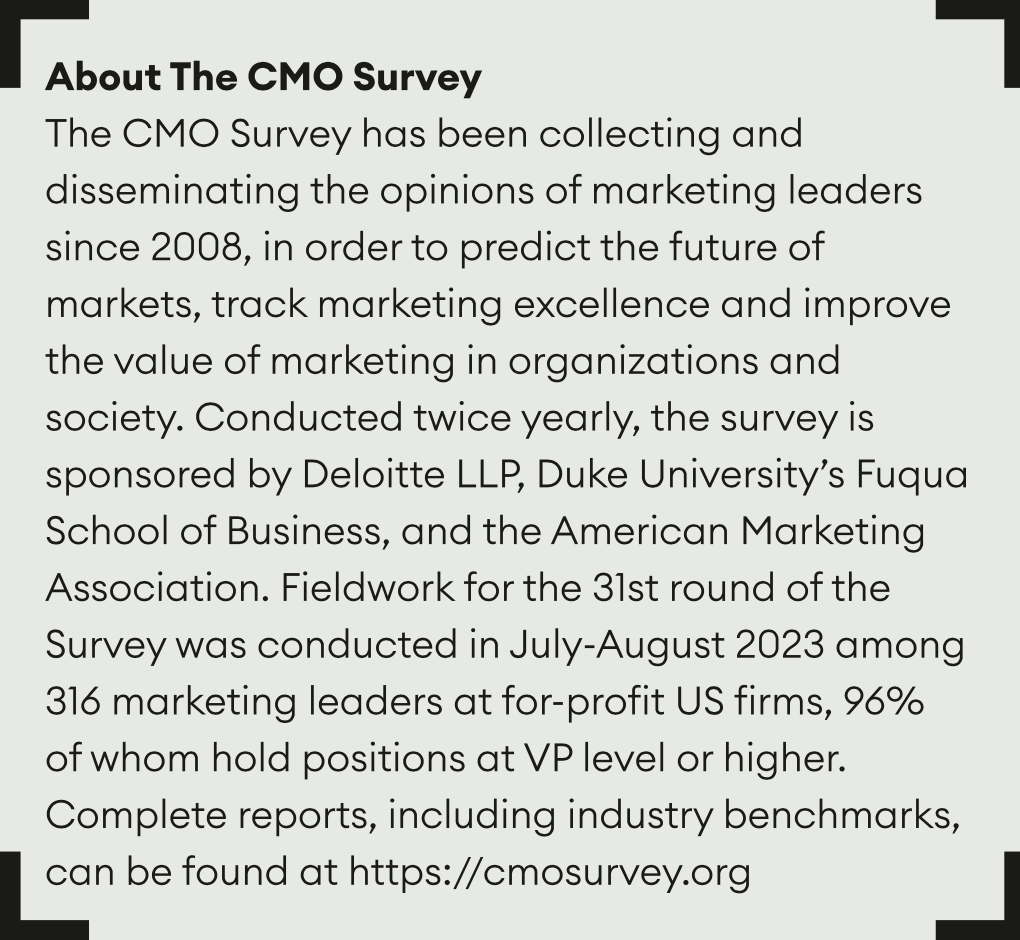Recession fears have faded but with modest growth forecast for the US economy in the year ahead, can AI and digital transformation help marketers raise their game?
One year ago, we asked how marketing might fare if the US economy plunged into recession (Christine Moorman, ‘The drive for value’, Dialogue Q1 2023). That scenario has been avoided, with the economy tracking toward growth of 2.1% in 2023 – yet it has not all been smooth sailing. Inflation, and consequent high interest rates, have had a major impact on many businesses, as well as on households. How, then, have marketers responded? And with the Federal Reserve forecasting weaker growth of 1.5% in the US economy in 2024, what might we anticipate for marketing in the year ahead?
Some light is shed on those questions by the results of the Fall 2023 edition of The CMO Survey, sponsored by Deloitte, the American Marketing Association, and Duke University’s Fuqua School of Business. They show that marketer optimism has risen, despite the ongoing economic challenges – and that AI and digital transformation could be key to marketing success over the coming year. Here are six key insights from the survey.
1 Marketer optimism has risen while marketing spend dampens
As recession concerns have faded, marketers’ optimism about the US economy has increased to 66.7 on a 100-point scale, up from 57.7 a year ago. Almost half (49%) of marketers report that they are more optimistic about the economy than they were last quarter, up from 30.1% in the spring 2023 survey.
Yet inflation and its attendant uncertainty continues to have a dampening effect on marketing spending, particularly for B2B products. Overall, marketing budget as a percentage of company budget dropped to 10.6% from 12.3% in the spring 2023 survey.
2 Marketing performance strengthens
Christine Moorman, professor at Duke University’s Fuqua School of Business and the director of The CMO Survey, notes that “marketing optimism may, in part, be buoyed by marketing performance, which remains strong relative to the pandemic”. Reported profit growth has strengthened to 8%, from 5.6% last year. Company sales growth, while slowing, remains positive at 10.8% and well above its pandemic low of 2.6%. Customer retention, customer acquisition, and brand value also increased, with brand value increasing dramatically from 6.3% growth last year to 9.7%.
3 Diversity, equity and inclusion (DEI) in marketing drops off
One of the most striking findings of the most recent edition of The CMO Survey is how DEI initiatives have decelerated. Marketing leaders report growth in DEI spend slowing to 2.3% this year, down from 10.7% just a year ago. Fewer marketers expect DEI to be a marketing priority over the next five years: less than half (41.4%) believe it will be prioritized, compared to 58.7% in August 2021.
“One reason for this is that DEI marketing investments are viewed as having weak returns,” says Moorman. Marketers report that the effects of DEI marketing investments are weaker than a year ago across multiple metrics, including stock returns (rated 1.8 on a scale from 1, ‘not at all’, to 7, ‘a great deal’); sales growth (2.5); customer retention (2.7); customer acquisition (2.8); employee attraction (3.5); and employee retention (3.5).
4 Brand activism shifts toward hot-button issues
While marketing spend on DEI has slowed, it is clear that marketers have engaged with a number of hot-button issues. The top three social issues that brands act for or against are LGBTQ+ equality (59.0%), Covid-19 safeguards (58.3%), and racial equality (53.2%). The largest increases in actions related to abortion (+580% since 2021), firearms (+227%), and climate-related issues (+70%). Those increases reflect how debate around these contested societal issues has intensified in the last few years. (See ‘Leading through division’, Dialogue, Q4 2023.)

5 AI in marketing is young, but pays off
While artificial intelligence (AI) has been around for some years, survey results show that it has only recently reached marketing use cases: 94.1% of marketers report have begun to leverage this technology in the past three years, and 60.4% for less than one year.
The top uses of AI in marketing are content personalization and content creation, including for blogs and website content, social media and email marketing. It is much less widely used to improve marketing ROI by optimizing the content and timing of digital marketing, for programmatic advertising and media buying, for predictive analytics to generate customer insights, and for targeting decisions – roughly one third of marketing organizations use AI for these purposes.
The approach adopted to implementing AI to date has had positive results, points out Moorman: “Marketing leaders report that sales productivity has improved by 6.2% and customer satisfaction by 7.0%, while marketing overhead costs have decreased by 7.2%.”
6 Digital marketing transformations progress slowly
The results show that US businesses are making progress in their digital marketing transformations. Fewer companies remain in the nascent phase – the early steps of designing and visualizing a transformation (down from 27.1% to 8.8%). More companies are in the emerging phase, where they are building non-integrated digital elements (up from 52% to 54.2%), the integrated phase (up from 13.9% to 24.2%), and in the most-advanced institutionalized phase, where digital investments are leveraged to drive and evaluate marketing decisions (up from 7% to 12.8%). Yet this leaves considerable opportunity for progress.
Senior marketing leaders continue to drive 70% of transformations – and their continued leadership is likely to be essential if businesses are to accelerate their progress on digital transformation.
With weak economic growth forecast for 2024, marketers will inevitably be under pressure to deliver improved results, despite companies’ falling marketing spend. The effective use of AI and accelerating digital transformation could be key to delivering the performance that organizations will need to thrive in an uncertain climate in the year ahead.
Patrick Woodman is editor of Dialogue.


